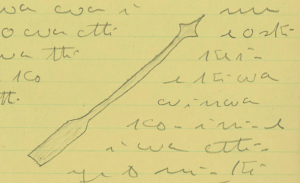 A remarkable corpus of more than 27,000 pages of traditional stories and ethnographic material written by monolingual Meskwaki speakers in the early 20th century using the Meskwaki syllabary is stored at the Smithsonian’s National Anthropological Archives. I have edited, translated, and published some of the shorter narrative texts (listed below) and am preparing an edition of one of the longest texts for future publication.
A remarkable corpus of more than 27,000 pages of traditional stories and ethnographic material written by monolingual Meskwaki speakers in the early 20th century using the Meskwaki syllabary is stored at the Smithsonian’s National Anthropological Archives. I have edited, translated, and published some of the shorter narrative texts (listed below) and am preparing an edition of one of the longest texts for future publication.
Smithsonian linguists Ives Goddard and Lucy Thomason have also edited and published many texts from the corpus; see the Recovering Voices (Smithsonian Institution) website. [link]
Publications of mine which contain an edited and translated text:
Dahlstrom, A. (2015). Highlighting rhetorical structure through syntactic analysis: An illustrated Meskwaki text by Alfred Kiyana. In D. Costa (Ed.), New Voices for Old Words: Algonquian Oral Literatures, 118-197. Lincoln: University of Nebraska Press. [NB: the first run of copies contained errors introduced by the press. Later print-on-demand orders will be correct, but in the meantime please find a correct version of my chapter here or download an errata sheet here.]
Dahlstrom, A. (2003). Owls and cannibals revisited: Traces of windigo features in Meskwaki texts. In H.C. Wolfart (Ed.), Papers of the Thirty-fourth Algonquian Conference, 81-114. Winnipeg: University of Manitoba. [pdf]
Dahlstrom, A. (2003). Warrior powers from an underwater spirit: Cultural and linguistic aspects of an illustrated Meskwaki text. Anthropological Linguistics, 45(1), 1-56. [pdf]
Dahlstrom, A. (1996). Narrative structure of a Fox text. In J.D. Nichols and A.C. Ogg (Eds.), nikotwâsik iskwâhtêm, pâkihtêpayih! Studies in Honour of H.C. Wolfart, 113-162. Algonquian and Iroquoian Memoir 13. Winnipeg: Algonquian and Iroquoian Linguistics. [pdf]
Dahlstrom, A. (1996). Edition and translation of esamegamata menetowita sakimewa [Mosquito, who fasted too long and became a spirit]. Contemporary Linguistics 2, 121-130. [pdf] NB: better formatted and slightly revised translation (July 2015) here.
In preparation:
Edition and translation of wisakea osani okyeni osimeani okomeseani [Wisahkeha, his father, his mother, his younger brother, his grandmother] (original Meskwaki text: 1110 ms. pages.) (sample page here)
See also the discussion of editing texts in:
Dahlstrom, A. (2006). The syntax of Algonquian ethnopoetics. In H.C. Wolfart (Ed.), Actes du 37e Congrès des Algonquinistes,131-147. Winnipeg: University of Manitoba. [pdf]
